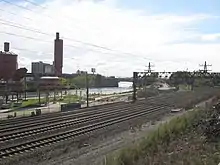 | |
| Overview | |
|---|---|
| Locale | New Rochelle, New York to Bronx County, New York City |
| Dates of operation | 1873–1927 |
| Successor | NYNH&H |
| Technical | |
| Track gauge | 4 ft 8+1⁄2 in (1,435 mm) standard gauge |
The Harlem River and Port Chester Railroad (HR&PC) was chartered in 1866 as a branch line railroad between New York City and Port Chester, New York. The line opened in 1873 as part of the New York, New Haven and Hartford Railroad and served in various capacities until 1971. The HR&PC is now part of the Hell Gate Line section of Amtrak's high-speed Northeast Corridor.
History
Early history


The Harlem River and Port Chester Railroad was chartered April 23, 1866 as a branch line from the Harlem River at the north end of the Harlem Bridge (now the Third Avenue Bridge) in New York City to the Village of Port Chester in Westchester County, New York at the Connecticut state border. Only the southern portion was completed, terminating instead about five towns southwest of Port Chester in New Rochelle. At the time, New Rochelle was the final railroad station when traveling from Connecticut before entering New York City.
The New York and New Haven Railroad and the Hartford and New Haven Railroad merged to create the larger New York, New Haven and Hartford Railroad in 1872.[1] The HR&PC was leased by the New Haven Railroad in 1873 and opened later that year, running from the New Haven at New Rochelle south into the Bronx.[2][3] Leasing the line enabled the New Haven to establish a continuous line of service from Connecticut to Manhattan. The HR&PC provided freight service between New York City and the Harlem River Yard.[4] Commuter service ran along the line from the Harlem River Terminal up to the New Haven main line in New Rochelle until 1931.
The New York, Westchester and Boston Railway commuter rail line opened in 1912, paralleling the HR&PC just to the west, south of the crossing of the Bronx River. Until 1924, when a new combined station was built, the short Willis Avenue Spur of the elevated IRT Third Avenue Line ran to the Harlem River terminal of the HR&PC and the NYW&B.
In 1917 the New York Connecting Railroad opened for passenger service between the HR&PC at Port Morris and the Pennsylvania Tunnel and Terminal Railroad at Sunnyside Yard. This allowed NYNH&H trains to run over the HR&PC and into New York Penn Station, though most continued to serve Grand Central Terminal until Amtrak took over intercity operations in 1971.
Later years
On January 1, 1927 the HR&PC was merged into the New York, New Haven and Hartford Railroad. It became the Harlem River Branch. The NYNH&H was merged into Penn Central in 1969, and Penn Central became part of Conrail in 1976. The HR&PC was ultimately sold to Amtrak and is now part of their Northeast Corridor used by its high-speed Acela Express.
Station listing
| Locality | Milepost | Station | Lat/long | Notes/Connections | ||||
|---|---|---|---|---|---|---|---|---|
| The Bronx | 0.0 | Harlem River Terminal / Willis Avenue | Also connected to IRT spur and NYW&B | |||||
| NYCR joins HR&PC from Hell Gate Bridge | ||||||||
| 0.9 | Port Morris | Also connected to NYW&B | ||||||
| 1.9 | Casanova | Also connected to NYW&B | ||||||
| 2.6 | Hunt's Point | Also connected to NYW&B. Today a retail block | ||||||
| 3.2 | Westchester Avenue | Also connected to NYW&B | ||||||
| 3.9 | West Farms | |||||||
| 4.8 | Van Nest | |||||||
| 5.4 | Morris Park | |||||||
| 5.8 | Westchester | |||||||
| 7.2 | Baychester | |||||||
| 8.2 | City Island | Also called Bartow station | ||||||
| Westchester | 9.8 | Pelham Manor | ||||||
| 10.8 | Woodside | |||||||
| HR&PC joins NYNH&H Main Line | ||||||||
| 11.5 | New Rochelle | |||||||
| Acquired by New York, New Haven and Hartford Railroad in 1927 | ||||||||
See also
References
- ↑ Manual of the Railroads of the United States: For ... 1875/76. 1876. p. 104. Retrieved October 17, 2017.
- ↑ NYNH&H History (archive)
- ↑ "THE SALE AT PELHAM BRIDGE". The Chronicle. Mount Vernon, New York. July 25, 1873. p. 1. Retrieved October 16, 2017 – via Nyshistoricnewspapers.org.
- ↑ "REAL ESTATE MATTERS — Near Opening of the Harlem and Portchester Railroad [The New Haven Branch Line]" (PDF). New York Herald. October 29, 1873. p. 4. Retrieved October 16, 2017 – via Fultonhistory.com.
Sources
- Railroad History Database
- PRR Chronology Archived September 7, 2006, at the Wayback Machine